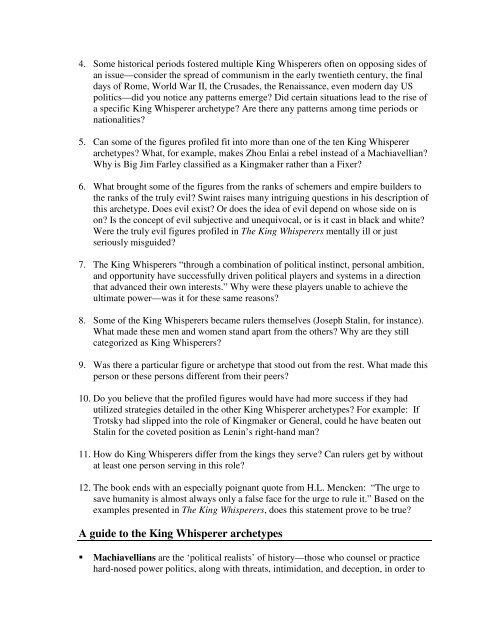Download a Book Club Discussion Guide - Kerwin Swint
Download a Book Club Discussion Guide - Kerwin Swint
Download a Book Club Discussion Guide - Kerwin Swint
Create successful ePaper yourself
Turn your PDF publications into a flip-book with our unique Google optimized e-Paper software.
4. Some historical periods fostered multiple King Whisperers often on opposing sides of<br />
an issue—consider the spread of communism in the early twentieth century, the final<br />
days of Rome, World War II, the Crusades, the Renaissance, even modern day US<br />
politics—did you notice any patterns emerge? Did certain situations lead to the rise of<br />
a specific King Whisperer archetype? Are there any patterns among time periods or<br />
nationalities?<br />
5. Can some of the figures profiled fit into more than one of the ten King Whisperer<br />
archetypes? What, for example, makes Zhou Enlai a rebel instead of a Machiavellian?<br />
Why is Big Jim Farley classified as a Kingmaker rather than a Fixer?<br />
6. What brought some of the figures from the ranks of schemers and empire builders to<br />
the ranks of the truly evil? <strong>Swint</strong> raises many intriguing questions in his description of<br />
this archetype. Does evil exist? Or does the idea of evil depend on whose side on is<br />
on? Is the concept of evil subjective and unequivocal, or is it cast in black and white?<br />
Were the truly evil figures profiled in The King Whisperers mentally ill or just<br />
seriously misguided?<br />
7. The King Whisperers “through a combination of political instinct, personal ambition,<br />
and opportunity have successfully driven political players and systems in a direction<br />
that advanced their own interests.” Why were these players unable to achieve the<br />
ultimate power—was it for these same reasons?<br />
8. Some of the King Whisperers became rulers themselves (Joseph Stalin, for instance).<br />
What made these men and women stand apart from the others? Why are they still<br />
categorized as King Whisperers?<br />
9. Was there a particular figure or archetype that stood out from the rest. What made this<br />
person or these persons different from their peers?<br />
10. Do you believe that the profiled figures would have had more success if they had<br />
utilized strategies detailed in the other King Whisperer archetypes? For example: If<br />
Trotsky had slipped into the role of Kingmaker or General, could he have beaten out<br />
Stalin for the coveted position as Lenin’s right-hand man?<br />
11. How do King Whisperers differ from the kings they serve? Can rulers get by without<br />
at least one person serving in this role?<br />
12. The book ends with an especially poignant quote from H.L. Mencken: “The urge to<br />
save humanity is almost always only a false face for the urge to rule it.” Based on the<br />
examples presented in The King Whisperers, does this statement prove to be true?<br />
A guide to the King Whisperer archetypes<br />
Machiavellians are the ‘political realists’ of history—those who counsel or practice<br />
hard-nosed power politics, along with threats, intimidation, and deception, in order to


